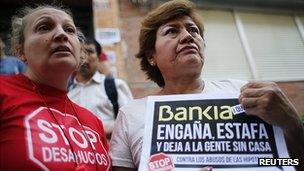Europe's days of anxiety
- Published
- comments

Evictions in Spain have fuelled anger against struggling cash-strapped banks
European leaders and officials were doling out whatever help they could to Spain today.
With Spanish borrowing costs edging up to 6.7%, the moment is approaching when Madrid will struggle to finance its needs at such rates. A bond yield (interest rate) of 7% is regarded as unsustainable.
So EU Commission President Barroso announced that the Commission favoured a banking union,, external with troubled banks being able to tap the EU's main rescue fund.
That - in the long term - could help Spain. It is estimated there are about 180bn euros (£144bn; $223bn) of bad loans from the collapsed property sector in the Spanish banking system.
Then the EU Economics Commissioner Olli Rehn said he was ready to extend by a year the deadline for Spain to reduce its deficit to 3% - if Madrid came up with a convincing plan for its budget for 2013-2014.
In reality no one expected that Spain would reach its target, but it reduces the pressure to make more radical cuts at a time the economy is in recession.
Then Chancellor Angela Merkel's spokesman came out and said the German government had confidence in the Spanish reforms.
Will all this help? Perhaps. But the problem for Spain is now. At a time when it is trying to reduce its deficit it is also having to consider funding its troubled banks and the regions, many of which are heavily overspent. The question is whether it can do this without a bailout, either for the banks or for the government.
Like Irish and Portuguese leaders before him, the Spanish Prime Minister Mariano Rajoy is fighting a desperate campaign to avoid a bailout. If he fails Italy could be next in line. Its borrowing costs have edged above 6%.
It remains the case that together the economies of Spain and Italy are too big to be rescued from existing funds.
Ireland votes again
A warning shot was fired at France today.
The Commission believes France will miss its target for reducing its deficit next year., external It will have to make extra spending cuts and/or raise taxes. This presents a political problem for President Francois Hollande, who has promised to increase growth. During the election campaign he laid out ambitious plans to hire extra teachers. His room for manoeuvre will be very tight.
Amidst the firefighting the Republic of Ireland will be watched closely. When it comes to the EU, Ireland is a beacon for consulting its people. Nine times they have been asked to vote on EU issues. On Thursday they will vote on whether to approve the so-called Fiscal Pact, which enforces greater budgetary discipline in the eurozone.
This time the influence of the Irish voter has been restricted. A "no" vote would not delay implementation of the pact. Only 12 countries are required to ratify it for it to become law - so that is not in doubt.
Even though the polls suggest the "yes" campaign will win there is some nervousness. For if the Irish rejected the pact the tremors would be felt across Europe. It would mean that - given the chance - a group of Europe's voters had turned against the austerity path. It would underline - following the election of Francois Hollande - that the mood in Europe is changing and that leaders can no longer ensure getting backing for further belt-tightening.
The "no" campaign has been using the slogan "warning: permanent austerity ahead".
The Irish government insists a "yes" vote is essential if Ireland needs to draw on EU funds in the future. A "no" vote would mean that Ireland would not be able to access the main bailout fund, the European Stability Mechanism, when it begins operation in July. That may be strictly true, although it is hard to see European officials denying Ireland funding in an emergency.
The most intense debate in Ireland has been over democracy and sovereignty.
The pact introduces rules and debt brakes intended to tie the hands of future governments. It poses the difficult question of how in a democracy the people can challenge spending limits they may not agree with.
One other interesting fact that has resonance elsewhere: the polls indicate that the "no" campaign has its strongest support among lowest income groups. It was a feature of the French election campaign that poorer voters were disillusioned with the benefits of globalisation, with the European project and the prospect of prolonged austerity.
Today President Barroso said "there is no magic bullet... (a solution) will take time and sustained efforts".